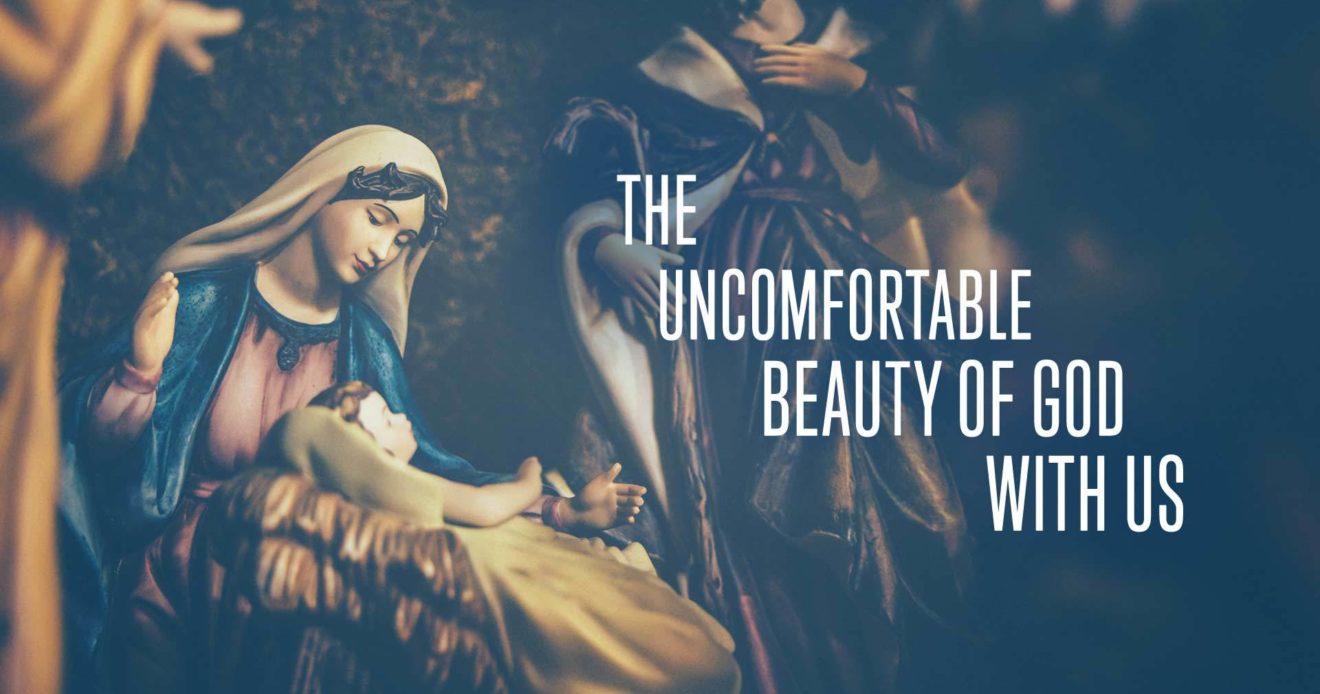
The Uncomfortable Beauty of God With Us
The birth of Jesus. The storybooks often tell it as a story of tranquility, peace, and holiness. But beneath the surface, we discover so much more. What if we took a step back and looked at the story from Mary’s perspective—visiting angels, family scandal, an extended trip at the most inconvenient time, even shunned moments before giving birth? It wouldn’t be all that hard to conclude that Mary suffered from depression, anxiety, betrayal, and a slew of other psychological issues. Let’s be honest with ourselves. Put in her situation, many of us would consider ourselves justified in experiencing any of these emotions.
As was the custom, Mary was arranged to be married to a man named Joseph. Common in Jewish culture, the parents, made arrangements for their children to marry. Often based on convenience, location, social status, and other important factors. Keep in mind that Mary would have been no more than about 12 to 14 years old and Joseph a few years older.
The Announcement
“In the sixth month of Elizabeth’s pregnancy, the angel Gabriel was sent by God to a town of Galilee called Nazareth, to a virgin engaged to a man whose name was Joseph, a descendant of David, and the virgin’s name was Mary” (Luke 1:26). Luke’s account of this event seems simple enough yet wastes no time picking up some significant steam. “The angel came to her and said, ‘Greetings, favored one, the Lord is with you!’” (Luke 1:27). Of course, at this point, she was freaking out just a little. She must have had questions flying through her head faster than she could get them off her lips. Long story short, she is told that she is going to be pregnant...with the Son of the Most High (Luke 1:30-34). To make matters maybe worse, it is not by Joseph after they are married. That would be exciting, something to look forward to (Luke 1:35). Nope. Instead, the Spirit of God would conceive this baby. What?
Of course, hindsight is 20/20, but imagine what must have been going through her mind. “How in the world am I going to explain this?” Who is going to believe me? The marriage was off for sure. She might even be stoned for committing what would certainly be considered adultery. In Jewish culture, even though they were not technically married the arrangement sealed their commitment to each other. Breaking it meant punishment and shame to both families. Did Mary have plans? Hope for a family? The desire to make her parents proud and bring honor to her name? Given her situation, most of us would consider her life over. If not killed, certainly shunned and cast aside. She already was a nobody, the lowest class of Jews, the poor, the humble, and the most oppressed from Roman occupation of the Jewish world. On the surface, Mary had everything to lose.
The Response
Each of us has times that we consider the most compelling, the most thrilling, and the greatest reason to celebrate—new job, college acceptance, a championship. For most, these events call for incredible moments of celebration. Even at times, uninhibited joy, a complete disregard for what people think around you overtakes you. For Mary, instead of despair, depression, or anxiety, she celebrates. Not just any celebration, a party, a song, a moment of shear excitement. Often called Mary’s Magnificat, is song or poetic praise as a result of the news received of the coming Messiah by way of her womb.
It is a song about God, because of God. It is Mary praising God because he has chosen her, God is with her. She is excited because “from now on…” things will be different (1:48). Whether she realizes the gravity of the situation or not, she is experiencing the most significant shift in human history. Things can never be the same. Mary will never be the same, nor will her people. Recognizing the holiness, sovereignty, and majesty of God, Mary sets her sights on the plan of God being carried forth through her; and despite the impending circumstances that could get her in some serious trouble, she knows this is more than just about her. It is about a revolution. And it is all about Jesus, and it is because of Jesus. As N.T. Wright calls it, “This is the gospel before the gospel.”
A Joyful Burden
Mary begins to recognize that God’s promises to her ancestors are becoming a reality. Although she is not seeing them happen before her eyes, the understanding that God is with her changes the way she sees the world. Mary describes the acts of God that has yet to happen as if they are past realities (1:51-54). She is realizing that the covenant promises to Abraham are coming true in the unborn child inside her. Salvation is so certain that it is viewed as though it has already taken place and the coming of Jesus means God is setting up a new world order. She is excited not because of what God is doing for her, but what God is doing through her.
If being a young teenage mom isn’t enough, Mary had to digest the gravity of what she was being asked to do. This is not a big mission trip for few weeks, nine months, or 2 or 3 years; but a lifetime. Mary had to learn a new way to do life. She would have to endure the stares, the gossip, the hurtful words. She will be forced to give birth without proper care. She and Joseph would be told the flee for fear of the life of their young son. She will lose him for three days when he is twelve. Her heart will break for her son when she thinks he has gone insane when he is 30, and she will be crushed when he is tortured and hoisted up on the cross. Consequently, Mary has every reason to cry herself to sleep at night, slip into a state of depression, and even consider giving up. And would anyone blame her?
The unknown’s are endless. Yet Mary’s focus remains somehow different. She sees the situation, not as many of us might—reluctance, despair, and hopelessness. Instead, she sees it with the eyes of God. Mary sees a day when the powerful prideful rulers will be brought down, and the humble lifted up. She sees a day when Israel will be blessed and that blessing extended to the nations. She sees this because God is with her. She sees this because she is a citizen of a different kingdom. Those who think they have the authority do not have the ultimate authority. Everything that Mary is excited about is wrapped in the Jewish hope of redemption and salvation of a nation. Mary is anticipating that because of the child that is in her, Israel will be vindicated. But her praise is not limited to Israel.
Because of Jesus
However, this celebration reaches far beyond Israel. Jesus as “God with us” extends to more than just one nation. The promises of God to Abraham were never meant to remain limited to just a simple family. Instead because of Jesus, kingdom citizenship is offered to all who believe and follow Jesus. To those who would trust in the promises of God and his kingdom, to all those who would repent from the kingdoms of this world, and to all those who would wholeheartedly believe that regardless of present circumstances, the mission of God—of redemption, restoration, and salvation—would be completed.
It is because of Jesus, because of Immanuel, that the hope of a new kingdom continues and it is because of Jesus that you and I are given the opportunity to take part. But how are we able to do this? How are we able to see differently? How are we able to live so committed that nothing shakes us? It might seem easy for us to appreciate, even exalt Mary for her willingness. Especially as a young child, to bear the burden she did is admirable. But we cannot stop there. She was prepared for this moment and the moments to come. It is that simple. She was prepared. The string of thoughts that she used to rejoice was not some random tirade that had never previously crossed her mind. These were parts of Psalms, characteristics of God promises she learned, stories she had heard about God a thousand times. Even though during her time, it seemed as though God was a million miles away and ignoring Israel—Mary knew Him, and she knew the hope. And it is because of this knowledge that she can truly live in humility, appreciating her low position because she recognizes her place in a different kingdom; because she is a citizen. This kind of humility does not live in reluctance, vengeance, or misgivings—it lives in confidence. Mary was confident in who God is, confident in his timing, and confident in the outcome of his plan.
These characteristics of a kingdom citizen are essential. And they are possible because of Jesus. They are possible because of Immanuel. God has come to dwell with his creation, in the flesh, as his creation. Because of Jesus, the world is turned on its ear; a revolution has begun. Because of Jesus, we can proclaim that what God is still working on is complete. Because of Jesus, we claim victory. Because of Jesus, we have nothing to fear.
Mary humbled herself and became a willing servant to the will of God so that God could do something through her. That is the call of a kingdom citizen. That is Immanuel and the beauty of God with us. God is with us, not so that we can be comfortable and secure and have all that we need according to our plans and dreams. Instead, God is with us so we can put ourselves aside and let him do mighty things through us.
Matthew’s gospel begins with the announcement that Immanuel has come—that God is with us. But Matthew’s gospel also closes with Jesus giving his disciples their final instructions to go and make disciples. But as they lived out the mission of the church, Jesus reminded them that he would be with them always—until the end of the age (). God with us did begin and end with the incarnation of Christ. It continues as the church carries out the mission to make disciples. Like Mary, the church has been commissioned to allow God to work through us. Like Mary, the church has been called to do the impossible, go against the norm, and follow Christ relentlessly and unapologetically.
As we celebrate the birth of Christ, take a minute and read Mary’s Magnificat (Luke 1:46-55). Use that time to search for how God is asking to work through you and your church community. Take the time to rediscover how God has been with you, rediscover hope, and rediscover the mission God has placed before you.
Steve Kozak
Executive Director of AwanaYM
Steve currently serves as the Executive Director of AwanaYM. Previously, Steve spent over a decade teaching high school theology and apologetics from Detroit to LA. Steve holds a Masters degree in Theology from Moody Theological Seminary and a Masters in Christian Apologetics from Biola University. Steve is also an adjunct professor at Trinity International University. He speaks and writes on youth ministry, youth culture and apologetics. He resides in Chicago, IL with his wife and four children.FollowSteve Kozak on Twitter: stevenmkozak
Comments
Get the AwanaYM Update
Receive youth ministry resources in your inbox. Subscribe today!
